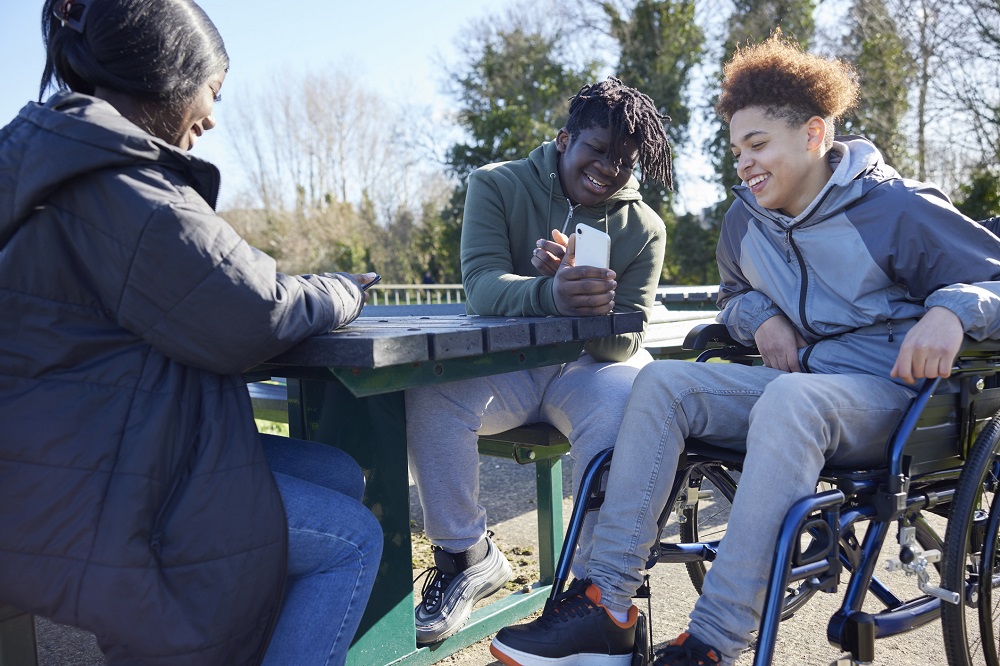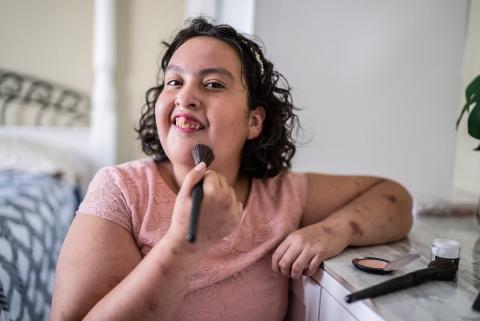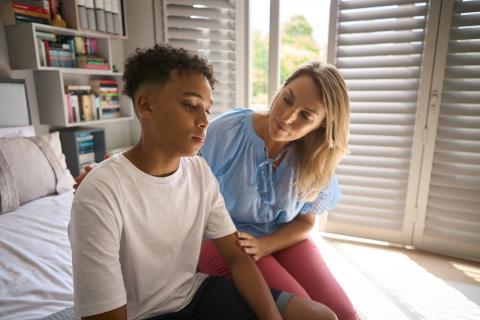Teenage friendships can be really complicated. One day they’re best pals, the next they’re barely speaking. But these ups and downs are all part of growing up and discovering who they are. The tips on this page can help you support your teen when they fall out with their friends, are upset by them or feel left out.
You can read about what to do if you’re worried your teen’s friendships are unhealthy or toxic here. If you think they may be being bullied you can find out more about what to do about bullying here.
Understanding teen friendships
Sometimes when we look back at our own teen years or at the way our teen children behave we wonder why everything has to be such a drama. Why do the kind of things we can brush off now, like not being invited to a party, seem like the end of the world when we’re young? Why are teen friendship dynamics so complicated?
But the thing to remember is that teenagers’ brains aren’t fully developed yet. Brains take a long time to grow (into our mid 20s)! The part of their brain responsible for thinking things through is still growing, while the part of their brain that deals with emotions and instincts is much more developed, which means it tends to take over.
As teens grow and start to become more independent, their friends become increasingly important to them. And because they’re thinking with the emotional part of their brains not the rational part, they’re super sensitive to what their friends think of them, and can take what they see as rejection or being left out incredibly personally.
On top of that, because their emotions are in the driving seat, they can sometimes say or do thoughtless or unkind things to each other without considering the consequences.
This can make teen friendships quite volatile. But there are things you can do to support them through the ups and downs.
Tips to help if they fall out with their friends
Tip #1: Help them calm down
If they’re upset, our page on helping your teen with anxiety has lots of tips to help them calm down and relieve physical symptoms of anxiety like feeling tense or breathless.
Tip #2: Let them talk
Give your teen plenty of opportunities to talk to you about any friendship issues they may be having. Listen carefully to what they have to say and try not to judge or offer your opinion – they may just want to vent. Or they may want some sympathy. In this case, you could acknowledge how they feel, for example by saying things like ‘That must be really upsetting for you’ or ‘I can see that’s made you’re angry.’
Tip #3: Help them see the situation more clearly
Even if you think your teen is overreacting, try to avoid the temptation to dismiss their feelings by saying something like ‘You’re making a mountain out of a molehill’ or ‘It’ll all blow over’. Instead, try to encourage them to see the situation from all sides, by asking questions like ‘Why do you think they said that?’ ‘Do you think they really meant it?’
Together you could discuss how to resolve the solution before it escalates and spoils the friendship.
Tip #4: Encourage them to take a screen break
Social media can make disputes between friends get out of hand quickly. If this is happening with your teen, encourage them to put their phone or device away for a bit until things have calmed down. Posting updates while they’re upset or angry won’t help. You could also suggest they have a look at the Mind Yer Time website, which has tips from young people for using screen time positively.
Tip #5: Help them build their self-esteem
Feeling left out or rejected can really affect your teen’s self-esteem, denting how much they value and believe in themselves. This page has some tips to help you support your teen to rebuild their self-esteem.
Tip #6: Be a good role model
Your teen won’t want to admit it, but you’re still a big influence on their life. So set a good example by making time for your own friends and treating them with kindness and respect. You could show your teen that you don’t have to agree with someone all the time to stay friends, and that it’s okay to argue with friends sometimes as long as you treat each other with respect and make up afterwards.
You can also model good ways of communicating with friends online, to show that, while your friends are important, you don’t have to be available to them 24/7. For example, if a friend messages you while you’re spending time with your teen, you could tell your teen that you’ll get back to your friend later rather than responding straightaway.
Tip #7: Don't judge them
Being friends with someone means trusting them. And sometimes teens put their trust in the wrong person and it backfires – for example if secrets or photos end up getting shared around the school.
In this case, let them know that there’s nothing wrong with trusting people – it means they’re a good, kind person. Later on you can maybe talk to them about thinking more carefully about who they trust.
(If you’re concerned about them sharing nude images, you can find more advice here.)
Tip #8: Remember friendships change
It’s completely natural for your teen to change their friends as they grow up and acquire new interests. So don’t be surprised or worried by this. But if a friendship ends suddenly (for example, with a big argument) this can be upsetting, so let your teen know that you’re there for them if they want to talk. You could also point them towards this helpful article from The Mix on how to cope with friendships ending.
 Activities & Play
Activities & Play Behaviour
Behaviour Childcare
Childcare Development & Growing Up
Development & Growing Up Family, Friends & Relationships
Family, Friends & Relationships Feeding Your Baby
Feeding Your Baby Food & Eating
Food & Eating Health & Safety
Health & Safety Mental Health & Wellbeing
Mental Health & Wellbeing Money & Work
Money & Work Online Behaviour & Safety
Online Behaviour & Safety Pregnancy & First Days
Pregnancy & First Days School & Education
School & Education Sleep
Sleep









 Behaviour
Behaviour
 Mental Health & Wellbeing
Mental Health & Wellbeing